Brian May's other equipment
It's not all about the Red Special...
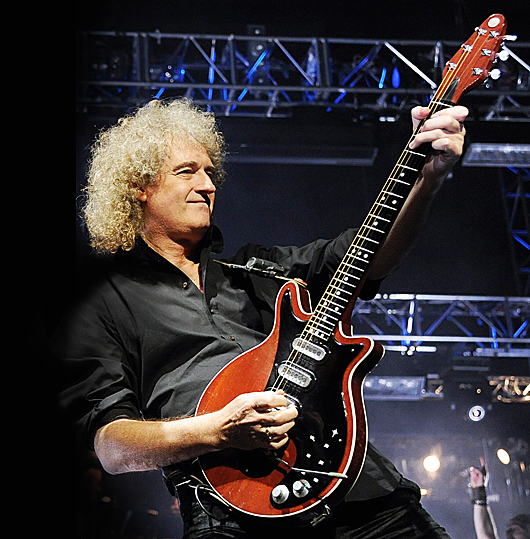
Brian May's Other Equipment
In the history of the rock guitar, Queen’s Brian May is surely unique in that he has used just one instrument for pretty much his entire career, both in the recording studio and onstage. What’s more, it’s one he built in a shed at the bottom of his garden.
Even those with just a passing interest in the band’s output will find it difficult to believe that the guitar sounds they’re hearing all came froma single instrument. Even Eddie Van Halen, probably the only other guitarist to have enjoyed the same level of stadium-filling success playing an instrument he made himself, jettisoned his striped-up Frankenstein when he finally threw in his lot with Ernie Ball.
Brian still uses his Red Special, but as fascinating as the story is, we’re not here to talk about it.In the issue 338 of Guitarist magazine, Brian tells us about some of his lesser known pieces of gear - and here is an additional look at yet more gems unearthed from his vault, complete with insights from the man himself.
Click onwards for exclusive access to Brian May's gear vault...
Visit My Favourite Magazines to buy the latest issue of Guitarist.
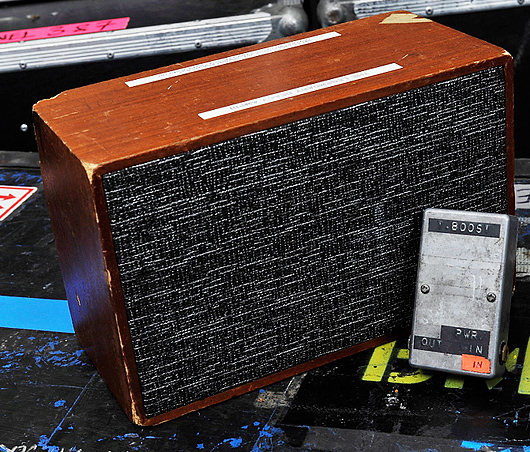
Brian May's Other Equipment - The Deacy amp
Brian May: “It’s kind of magic, that little amplifier. I don’t how it really works and it’s amazing that Deacy put it together from bits out of a skip! Many people have spent hours, days and weeks trying to figure out how it makes that noise. The thing with getting those sounds was all about having the microphone in the right place, moving it onto and off the axis of the speaker, putting it round the back, to the side. All those trumpet and trombone sounds came from that and also using a wah-wah pedal as a tone control. It’s all very crude, there’s no electronic processing at all.”
Don't miss the full feature in issue 338 of Guitarist magazine.
Visit My Favourite Magazines to buy the latest issue of Guitarist.
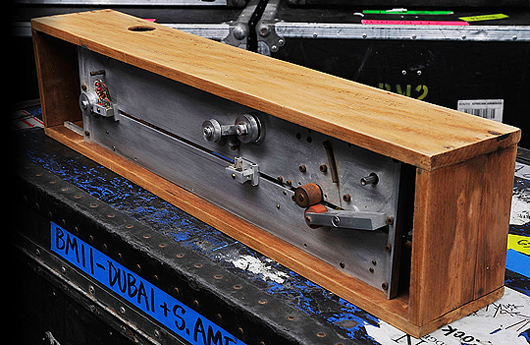
Brian May's Other Equipment - The homemade Echoplex
Brian May: “I made that partly at college and partly at the rehearsal place we were working at at the time. It’s one of my last efforts at DIY and it did work! I bought the pickups, built the whole rail system, wired it all up, got the right little amplifiers... Very enterprising in those days! It did work, but it was really non-reproducable, and we discovered that we could get an Echoplex and modify it, which was better. I wanted two of them and, of course, they were always breaking down, those things. It was a nightmare, we had endless fun trying to make them work on the road: they were never meant to be transported around!”
Don't miss the full feature in issue 338 of Guitarist magazine.
Visit My Favourite Magazines to buy the latest issue of Guitarist.
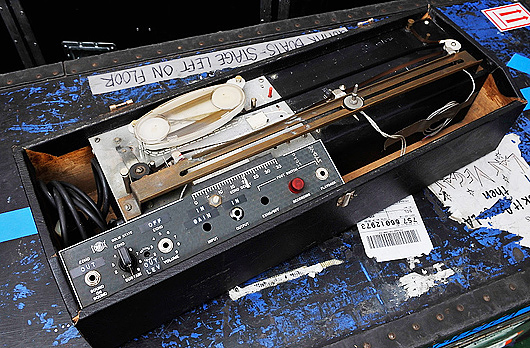
Brian May's Other Equipment - Echoplex EP3
An original EP3 modified by Brian to drastically increase its delay time. It was used, amongst things, on the track Stone Cold Crazy from 1974's Sheer Heart Attack.
Brian May: “Yes, I modified that for Stone Cold Crazy. I don’t think I could do it now... I can’t even work my TV remote these days!”
Don't miss the full feature in issue 338 of Guitarist magazine.
Visit My Favourite Magazines to buy the latest issue of Guitarist
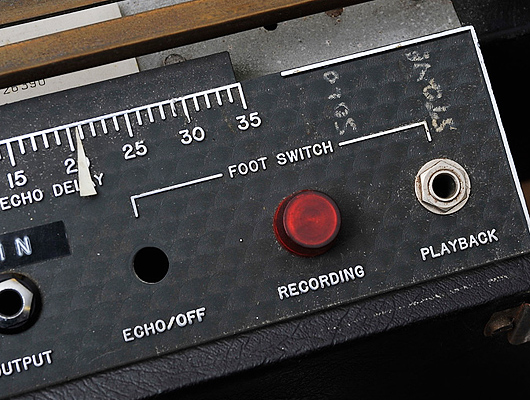
Brian May's Other Equipment - Echoplex EP3
A close up of the EP3 showing the specific delay settings for Stone Cold Crazy written directly onto the unit’s front panel. A genuine piece of Queen history...
Don't miss the full feature in issue 338 of Guitarist magazine.
Visit My Favourite Magazines to buy the latest issue of Guitarist
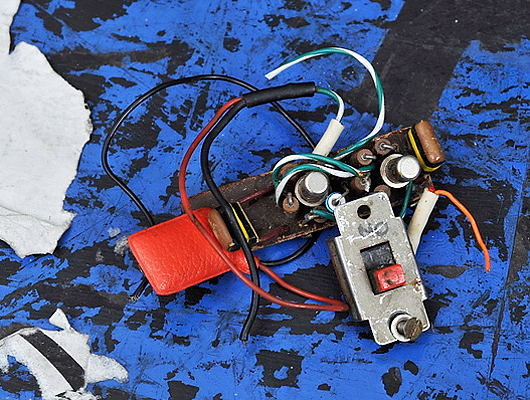
Brian May's Other Equipment - Vox Distortion Booster
A small piece of circuitry that Brian included inside his Red Special for a time before removing it once it became surplus to requirements.
Brian May; “It was called a Vox Distortion Booster, I think, and it came in a little rectangular, red box with a jack plug on the end. It was a fuzz box really, and you’d plug it into your amp, and your guitar into it. I remember, even in those days, that I would rather have the amp and guitar flat out to try and get the feedback naturally. But we would be in small studios and they wouldn’t let me turn up, and the only way to get any sustain at all quietly was to use something like that, a saturation box.”
Don't miss the full feature in issue 338 of Guitarist magazine.
Visit My Favourite Magazines to buy the latest issue of Guitarist
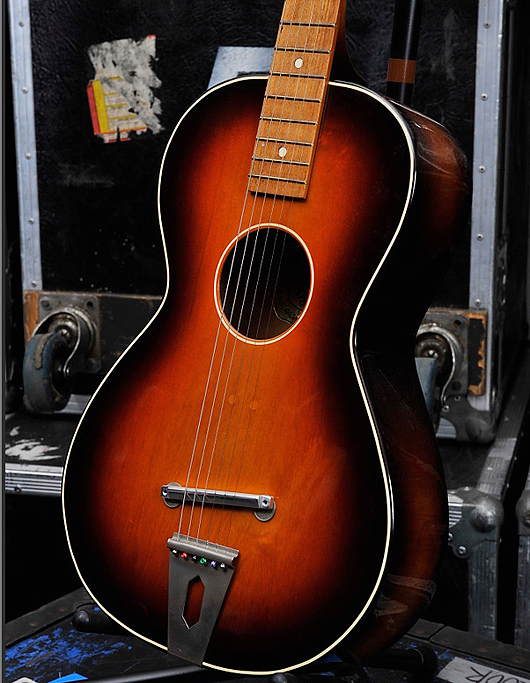
Brian May's Other Equipment - Egmond acoustic
This is Brian’s very first guitar that was restored to a mint and new condition by Suffolk luthier Andrew Guyton a couple of years ago.
Don't miss the full feature in issue 338 of Guitarist magazine.
Visit My Favourite Magazines to buy the latest issue of Guitarist
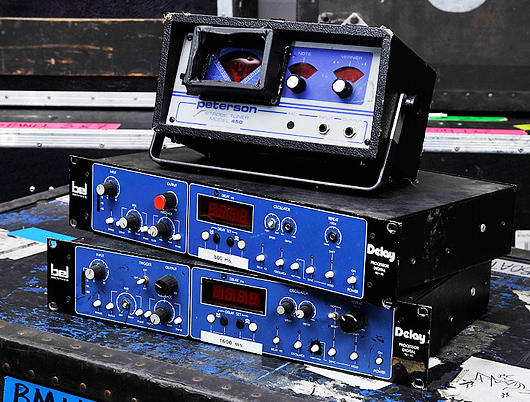
Brian May's Other Equipment - Bel BD-80 delays and Peterson 450 tuner
Two Bel BD-80 delays that together were used for Brian’s multi-delay solo showpiece. One unit was set to a delay time of 800ms, and the other to 1600ms. These days, a single patch of a Rocktron Intellifex takes care of all this. The other unit is Brian’s also-retired Peterson 450 stage tuner, which he kept atop his stack of AC30s.
Don't miss the full feature in issue 338 of Guitarist magazine.
Visit My Favourite Magazines to buy the latest issue of Guitarist
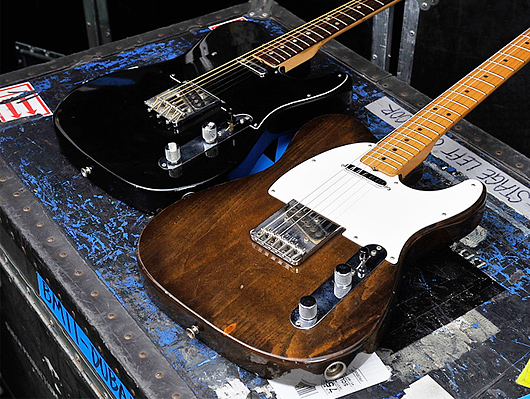
Brian May's Other Equipment - Crazy Little Thing Called Love Fenders
A taster of what’s included in the feature in issue 338 of Guitarist magazine: the Fender Esquire belonging to Queen drummer Roger Taylor used to record Crazy Little Thing Called Love, and the black Fender Telecaster used to play the song live. What’s the true story behind that elusive Esquire? You’ll have to buy the magazine to find out...!
Don't miss the full feature in issue 338 of Guitarist magazine.
Visit My Favourite Magazines to buy the latest issue of Guitarist...
Simon Bradley is a guitar and especially rock guitar expert who worked for Guitarist magazine and has in the past contributed to world-leading music and guitar titles like MusicRadar (obviously), Guitarist, Guitar World and Louder. What he doesn't know about Brian May's playing and, especially, the Red Special, isn't worth knowing.
“These guitars travel around the world and they need to be road ready”: Jackson gives Misha Mansoor’s Juggernaut a new lick of paint, an ebony fingerboard and upgrades to stainless steel frets in signature model refresh
“For some reason, the post office shipped your guitar to Jim Root of Slipknot”: Sweetwater mailed a metal fan's Jackson guitar to a metal legend
“These guitars travel around the world and they need to be road ready”: Jackson gives Misha Mansoor’s Juggernaut a new lick of paint, an ebony fingerboard and upgrades to stainless steel frets in signature model refresh
“For some reason, the post office shipped your guitar to Jim Root of Slipknot”: Sweetwater mailed a metal fan's Jackson guitar to a metal legend









